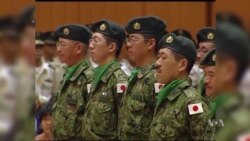The Japanese government is moving forward with a controversial security bill that would authorize the military to fight abroad for the first time since World War II.
Prime Minister Shinzo Abe and his supporters say Japan needs to increase the scope and power of its military to counter potential threats from countries like China and North Korea that are increasing their military and nuclear capabilities.
"The security situation surrounding Japan is becoming increasingly challenging. With this in mind, it is an absolutely necessary legislation to protect the lives of the Japanese and also to prevent the country from going to war," said Abe about the new security measures.
A new Ministry of Defense paper entitled “Defense of Japan 2015” highlighted China’s provocative and “coercive” efforts to stake out disputed maritime claims in the East China Sea that includes the construction of an offshore gas platform.
Critics Abroad, Protesters At Home
“China, particularly over maritime issues, continues to act in an assertive manner, including coercive attempts at changing the status quo, and is poised to fulfill its unilateral demands without compromise,” the report states.
China and South Korea have been critical of the new Japanese security bills. Beijing’s foreign affairs ministry spokesman Hua Chunying urged Japan to "stick to the path of peaceful development.”
The security bills would revise 10 existing laws and would give the military more latitude to defend its people and interests, to participate in collective self-defense and defend allies like the United States.
In February Prime Minster Abe said had the expanded security measures been in place, he could have sent in the military to rescue two Japanese hostages held by the Islamic State that were eventually executed.
But the security bills have also sparked protests by thousands of opponents who fear that easing the post-World War II pacifist constitution could entangle Japan in foreign conflicts.
Many Japanese strongly support Article 9 of their postwar constitution that renounces the use of offensive force to wage war or settle international disputes. In a recent poll 56 percent of the Japanese public opposes the new security measures and Prime Minster Abe’s disapproval rating rose five points to 42 percent.
The opposition can try to delay the bill’s passage in the upper house of parliament for 60 days but Abe's Liberal Democratic Party-led coalition has the two-thirds majority needed to pass it. The legislation could also face a court challenge once it becomes law from groups that argue the measures conflict with the nation’s pacifist constitution.
Protesters Converge on Okinawa
While Prime Minister Abe’s opponents can do little to block the legislation in the short term, they have been energized by the widespread protests and outpouring of public criticism.
Activists from Tokyo are now joining demonstrations in Okinawa to unite their cause to change Japan’s pacifist constitution with a local protest movement to halt the construction of a new airfield at a U.S. Marine Corps base.
“I am here in Okinawa to stop Abe from destroying the constitution and to stop the construction over here,” said Hideharu Kase, a protester who came from mainland Japan.
The prime minister is unpopular in Okinawa for supporting the new airbase when U.S. military bases already occupy 20 percent of the island.
“Move it somewhere else, not Okinawa, or eliminate it. That’s our, or more to say the majority of Okinawan people and Governor Onaga’s opinion,” said Junichi Tomita, the president of Ryukyu Shimpo, one of Okinawa’s leading newspapers.
Prime Minister Abe was recently heckled while appearing with Okinawa Governor Takeshi Onaga at a ceremony commemorating the 200,000 people who died in the Battle of Okinawa during World War II.
In the short term these opposition groups are not likely strong enough to challenge Abe, but his support for strong but controversial defense policies could erode his grip on power.












